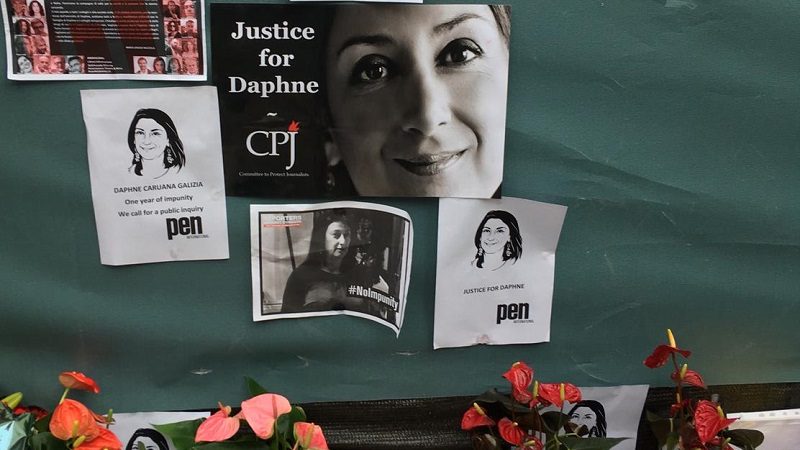Leading press freedom NGOs are calling on Prime Minister Joseph Muscat to hold a public inquiry into the murder of journalist Daphne Caruana Galizia as they hold a meeting with the authorities one year after her death. Yet in a meeting with Prime Minister Joseph Muscat that lasted over an hour he repeated his previously stated position that such an inquiry would only be considered after ongoing police and magisterial investigations were concluded.
The international NGOs pressed Muscat on the matter: “We disagreed on the timing. It needs to be immediate so we can ensure that we can understand fully what happened to Daphne and why this was allowed to happen, whether it could have been prevented. Other journalists can’t be protected if we don’t know what happened,” the director of Reporters Without Borders’ UK bureau told The Shift News.
The NGOs said they were in Malta to send a clear message to the authorities about the importance of press freedom while renewing the call for justice over her death. Members of the Committee for the Protection of Journalists (CPJ), European Centre for Press and Media Freedom (ECPMF) and the International Press Institute (IPI) are in Malta taking part in a number of events marking the one-year anniversary of Caruana Galizia’s assassination.
The international press freedom organisations also pressed Muscat on the ongoing libel suits filed by government members, including the Prime Minister. Hearings this morning on these cases were postponed.
Courtney Radsch, CPJ’s advocacy director, told The Shift News they were looking for “firm commitments” from the authorities that they were everything in their power to find the masterminds behind the killing.
“We also want to see a public enquiry that will look into the circumstances and commissioning around Daphne Caruana Galizia’s murder and we are calling for an end to the harassment of people – in Malta and abroad – who are campaigning for justice in the case, including the petty attempts to remove the public memorial,” Radsch said.
Flutura Kusari, legal advisor to the European Centre for Press and Media Freedom, said Caruana Galizia’s murder was “the obvious attempt” to silence her, while intimidating journalists around the world into self-censorship.
“Until there is a public inquiry, we will not be convinced that Prime Minister Muscat is doing everything he can to solve the case, as he promised after the murder. In addition, we are very concerned that the pressure exercised against her through defamation lawsuits is now extended to the family,” Kusari told The Shift News.
Last month, Prime Minister Joseph Muscat said he felt there was no need for a public inquiry, which had been requested by the Caruana Galizia family. Yet, the official reply sent by the Attorney General to the lawyers if the victim’s family said they were “actively considering it”.
Similarly, IPI Deputy Director Scott Griffen said they wanted a “clear commitment” from the government that the investigation into her murder was serious and that it will follow the evidence “regardless where it leads and regardless of whom it implicates”.
Radsch pointed out that one year passed and yet there was little progress in the case, and “no indication” that there is an investigation to find the mastermind behind her murder.
Griffen said their presence in Malta was to show that the international journalistic community cared about what happens. “We will not accept impunity”.
Daphne’s example mattered and the failure to solve her murder set a terrible example for Europe where press freedom, in theory, enjoyed high institutional and legal protection, he added.
With the available resources – on a local and EU level – there was no reason why Caruana Galizia’s murder should still remained unsolved and they would be asking the authorities to explain this “discrepancy”. “This lack of progress justifiably raises questions in the eyes of many”.
Similarly, Radsch said the CPJ was “gravely concerned” at the lack of political will to investigate her murder. “This impunity sends a chilling signal to journalists here that you cannot work on sensitive issues without taking grave risks. We are concerned that journalists critical of the government, such as Caruana Galizia, run the risk of social media bullying, libel suits, and harassment”.
Both the IPI and the CPJ wanted an end to the harassment of people who were calling for justice.
Griffen pointed out that this went beyond the personal tragedy of Caruana Galizia’s murder but about Maltese society that people deserved.
“A society defined by justice and the rule of law, where criminals are held to account regardless of who they are. Everyone in Malta who cares about free society – regardless of what they thought of Daphne and her work – should be deeply alarmed by this state of impunity,” he said.
Tributes laid by the international NGOs on Sunday night at the Great Siege Monument, which for the past year has been used as memorial to Caruana Galizia, were cleared overnight just one night before the anniversary of her death.













